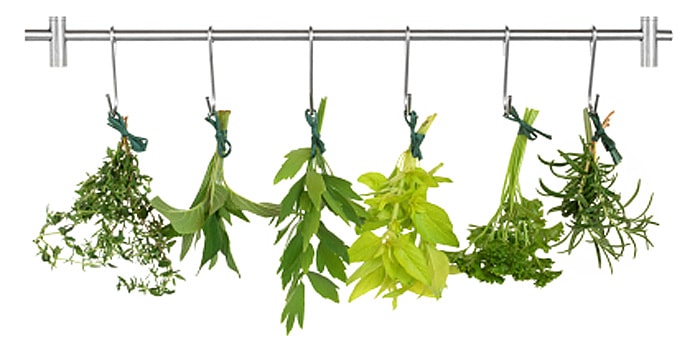
Written By: Christina Newberry
Reviewed By: Gloria Tsang, RD
Title: Registered Dietitian
Last Updated on:

In August, most herb plants are at their peak, and some of them can be incredibly bountiful (an anyone who’s ever grown a mint plant knows!). The good news is that you can save some of that delightful herb flavor to use in your kitchen all winter long (and avoid buying those ridiculously expensive dried herbs!) by harvesting your herbs now and preserving them for later use.

Drying: Drying is the simplest method of preserving herbs. All you need to do is cut some branches from your herb plant, wash them, pat dry, tie them together, and hang them in a warm, dry place for a couple of weeks. (If you like, you can put them in a paper bag with some holes punched in it to keep dust away.) Store the dried herbs in glass jars. This method works best for low-moisture herbs like sage, thyme, oregano, and rosemary.
Freezing: Frozen herbs are very wilted when defrosted, so they really don’t look pretty. That said, they work very well in sauces and other recipes where their appearance is not key. To freeze most herbs, lay the individual leaves on a try and place it in the freezer. Once the leaves are frozen, seal them in an airtight bag and pop it back in the freezer. This method is especially good for chives. For basil and mint, the best method is to pulse the herb in a food processor with a bit of water, then put the mixture into ice cube trays and cover with plastic wrap.
Preserving in salt: This method best preserves the herbs’ appearance. Simply layer sea salt and herbs in a glass jar until the jar is full and the herbs are covered. When you’re ready to use your herbs, remove the leaves from the salt and toss them in your recipes. The sea salt may retain a slight flavor from the herbs. If so, it can be used in recipes instead of plain salt to add a faint hint of herbal flavor. If not, you can use it again to preserve your next batch of herbs, or put it back into your regular sea salt supply.
There’s no need to let your herbs go to waste as winter approaches. With these simple preservation methods, you can enjoy herbal flavor from your summer garden all winter long.
Alumni: University of Victoria – Christina Newberry is a writer and editor whose work has appeared in national and local magazines and newspapers. With a Bachelor’s degree in English and Anthropology from the University of Victoria and a Journalism Certificate from Langara College, Christina brings keen curiosity and the love of a good story to her work with HealthCastle.com.
Christina is a passionate traveler and urban gardener with an interest in vegetarian eating and making good, tasty food from scratch. Sharing lessons learned from her own experiences, Christina writes about lifestyle topics for HealthCastle, with a focus on eating well at home and on the road.
herbs, spices, vegetable gardening